Please don a white feather and wear it proudly in your hat or on your lapel, anywhere on your costume or outfit to show support. By doing this or aligning yourself with The Order of the White Feather (OWF), you vow to do the following:
- Believe the victim. No matter who they name, even if you respect or love the person named. If the phrase “false accusations” is coming to mind right now, read this. And this. And this, too.
- Refrain from using victim-blaming questions and statements. All questions will be directed to the accused perpetrator, not the victim/survivor. The only thing you say to a survivor is this:
“I believe you. I’m so sorry that happened to you. You are safe now. I’m here for support. You can tell me as little or as much as you’d like, and I’ll believe you.” The only questions you ask a victim are like the following: “What do you want to do next?” or “Do you want to file a report?” It’s very important to let the victim know they are in complete control. The assault took that away from them, sometimes with great violence, other times through manipulation and coercion. In either case, it’s important to start to support them in regaining control of the situation. This alone is very empowering.See more examples of what and what not to say to a victim of sexual violence on the Survivor page. - Create a community “where the abusers stick out like a sore thumb,” to quote Thomas from Yes Means Yes Blog. OWF members vow to create and maintain a community where everything from the words they choose to their actions create and support an environment that does not give rapists and other sexual predators social license to operate. This includes refraining from misogynistic speech and phrasing; treating all people, regardless of gender, race, or sexual orientation, as human beings, not sexual objects or a collection of body parts;
- Commit to self-growth, self-awareness, and objective introspection. Talking about sexual violence across the entire spectrum (that is, accepting that predators commit rape and sexual assault in many ways that don’t look like the stereotypical stranger rape) make people very uncomfortable. We must be willing to look at our own behavior and beliefs, as well as the behavior and beliefs of those we love and respect the most, in order to truly stop sexual violence in our communities.
- If you choose to be more deeply involved, work with a local team of other OWF members to confront the accused perpetrator. This is to be done *nonviolently.* That means, no threats of violence or attacks or angry words of any kind. Aggression will only serve to alienate people and further traumatize the victim. Read O. M. Grey’s post on “The Power of Responsibility” for more information and sample questions. In the case of unrepentant rapists and abusers, those unwilling to accept responsibility or go through the accountability process, tell everyone what they did. As Thomas says, “Some people will say that’s rumormongering. Yes. Yes, it is. If stopping rape isn’t a good enough reason to spread rumors to you, then you and I have nothing further to discuss.”
- The original idea (given to me by creator of OWF) was to anonymously (for safety) send a blemished white feather (black mark across it) to the perpetrator along with a note that reads: “We know you are a sexual predator and have sexually assaulted at least one person in our community. Everyone you see wearing a white feather knows what you did. Everywhere you turn, you will have to face the shame that is solely yours. You are not welcome here.” For many, this is too confrontational, but use the idea to think of other safe ways to let the perpetrator know they aren’t welcome in your community anymore.
- However you do it, the point is this: Everyone will know. Make your community unsafe for the perpetrators. Never be silent again.
**WARNING** Predators will very likely wear white feathers in order to establish trust and create a benefit of the doubt, not to mention to get closer to their prey. If anyone exhibits predatory behavior, whether or not they’re wearing a white feather, get away fast. Examples of predatory behavior can be found HERE, also read O. M. Grey’s post on “Emotional and Sexual Predators.”

